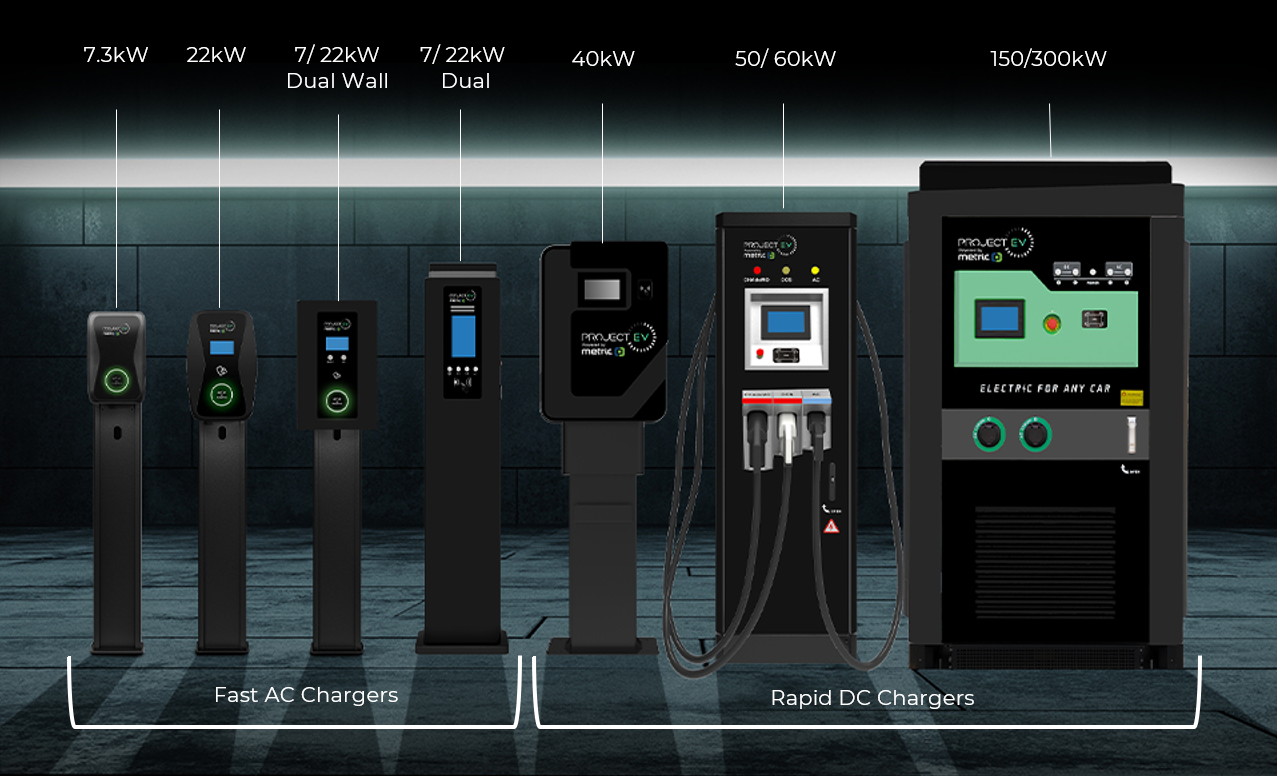
Metric Group offers a range of AC and DC charging solutions to suit your requirements. Different chargers can deliver more or less power output to suit different vehicle types or residential and commercial needs. So what is the difference between AC Chargers and DC Chargers?
Why are there two types of Charging Station (AC and DC)?
Firstly, you may already know what AC and DC stands for, but we are not going into the technicalities in this article. You can read about that yourself here >>>
What you need to know is that the power delivered by the national grid is always AC (Alternating Current), but electronic devices, like mobile phones, laptops and even electric vehicles must charge their batteries with DC (Direct Current). This requires the AC supply to be converted to DC. For Mobile phones and laptops, this is done inside the plug or power adaptor, supplied with the device. With EVs, the converter is built into the car or van.
This is so it is possible to charge your vehicle from a standard electrical socket or commercial 3 phase supply point. The car will convert the power from AC to DC and charge the battery.
If I can plug into a domestic socket, why do I need to use a charging station at all?
While you can plug into a domestic socket, there are a number of reasons you may not want to charge your EV this way:
- The supply is downrated for domestic use, so it takes a long time to charge
- Electrical unit cost can can be more expensive
- Inconvenience of running a cable from the house/garage
A dedicated charging station ensures a higher power output for faster charging. In addition there are intergrated safety features protecting you and your vehicle. Charging stations will often include smart features that can be used to control charging and ensure you are getting the best tarrif possible for the energy you use.
Do I Choose AC or DC Charging?
As previouslly mentioned, your EV requires DC to charge. The main technical difference between AC chargers and DC chargers is where the conversion from AC to DC actually takes place. AC chargers rely on the conversion happening INSIDE the car. DC chargers do the conversion themselves, OUTSIDE the car.
Using an AC Charger
Charging from an AC charging station is typically faster than a dommestic supply, but slower than a DC charging station. The size and capacity of the on-board converter is constrained by the space inside the vehicle and the manufacturers need to achieve a desired price point for the vehicle. Often the converter capacity is low so the power they deliver to the battery in any time period is restricted.
There are however advantages to AC charging in that the cost of installation and operation are lower than for DC charging. This has made them the most popular choice for charging vehicles that remain parked for 30 minutes or more (or even overnight). This makes them more popular for day to day use and domestic applications.
What about DC Chargers?
A DC charging station will, as mentioned, bypass the on-board converter, sending power directly and safely to the vehicle’s battery.
As the unit is external it is not constrained in size or capacity in the same way that internal AC converters are. A DC charger will use a high power supply to provide more capacity and include additional safety features and technology to automatically adjust the charge delivery level to suit the the battery requirements.
Due to the size and complexity of a DC Charger, they are usually more expensive to install and the charging costs are typically higher, as they deliver more power.
However, they do allow for a much faster charge time and are the preferred solution for service stations and commercial operations rather than home installations. They are perfect to deliver a quick charge during long distance journeys allowing users to get back on the road.
AC or DC – Which is best for me?
What is best for you depends completely on your situation. If you’re in need of a quick recharge to continue a long-distance journey then DC charging is usually the best way to go (if your car supports it). For day to day use around town, at home or parked at the office all day, AC charging will typically be the best way to charge your car.
What About the Cost of AC and DC Charging Stations?
The cost of using a charging station for the end user will depend on many factors and a user tariff is usually defined by the owner/operator of charging station. Energy costs (unit cost for electricity) are ultimately dependant on the utilities provider, regardless of AC or DC.
Costs for actually producing, installing and operating charging stations will tend to increase as the power of the charging station increases and more work is required for a larger commercial installation than for a home charger. However, once installed and commissioned, minimal maintenance should be required.
For more information
If you would like more information on Charging stations, or have any other questions about installing charging stations as part of your commercial landscape or linked to your existing parking operations, please use the Contact Us section here >>>